Deck 12: Game Theory and Business Strategy
Question
Question
Question
Question
Question
Question
Question
Question
Question
Question
Question
Question
Question
Question
Question
Question
Question
Question
Question
Question
Question
Question
Question
Question
Question
Question
Question
Question
Question
Question
Question
Question
Question
Question
Question
Question
Question
Question
Question
Question
Question
Question
Question
Question
Question
Question
Question
Question
Question
Question
Question
Question
Question
Question
Question
Question
Question
Question
Question
Question
Question
Question
Question
Question
Question
Question
Question
Question
Question
Question
Question
Question
Question
Question
Question
Question
Question
Question
Question
Question

Unlock Deck
Sign up to unlock the cards in this deck!
Unlock Deck
Unlock Deck
1/90
Play
Full screen (f)
Deck 12: Game Theory and Business Strategy
1
Dominant strategies
A)are always present in simultaneous games.
B)result in a prisoners' dilemma.
C)result in one firm winning and the other losing.
D)None of the above.
A)are always present in simultaneous games.
B)result in a prisoners' dilemma.
C)result in one firm winning and the other losing.
D)None of the above.
None of the above.
2
A payoff matrix
A)shows the payoffs (i.e. bribes)required to government officials for firms undertaking specific actions.
B)details the actions each firm takes.
C)shows the payoffs to each firm for each possible outcome.
D)is optional in game theory.
A)shows the payoffs (i.e. bribes)required to government officials for firms undertaking specific actions.
B)details the actions each firm takes.
C)shows the payoffs to each firm for each possible outcome.
D)is optional in game theory.
shows the payoffs to each firm for each possible outcome.
3
A game includes
A)a strategy.
B)payoffs.
C)rules.
D)All of the above.
A)a strategy.
B)payoffs.
C)rules.
D)All of the above.
All of the above.
4
In a static game, firms
A)compete multiple times until there is a winner.
B)compete only once.
C)must have complete information.
D)act sequentially.
A)compete multiple times until there is a winner.
B)compete only once.
C)must have complete information.
D)act sequentially.

Unlock Deck
Unlock for access to all 90 flashcards in this deck.
Unlock Deck
k this deck
5
In game theory, a strategy
A)is useless, because firms are subject to bounded rationality.
B)is useful in static games, but not in dynamic games.
C)defines the specific actions a firm will make.
D)determines the payoff matrix of the game.
A)is useless, because firms are subject to bounded rationality.
B)is useful in static games, but not in dynamic games.
C)defines the specific actions a firm will make.
D)determines the payoff matrix of the game.

Unlock Deck
Unlock for access to all 90 flashcards in this deck.
Unlock Deck
k this deck
6
A player's best response is
A)the strategy that maximizes his payoff given what he thinks the other player will do.
B)a dominant strategy.
C)impossible to find when there isn't a Nash equilibrium.
D)a way to avoid the prisoners' dilemma.
A)the strategy that maximizes his payoff given what he thinks the other player will do.
B)a dominant strategy.
C)impossible to find when there isn't a Nash equilibrium.
D)a way to avoid the prisoners' dilemma.

Unlock Deck
Unlock for access to all 90 flashcards in this deck.
Unlock Deck
k this deck
7
When both firms have dominant strategies
A)the outcome is called a dominant strategy solution.
B)joint profits are maximized.
C)there are multiple Nash equilibria.
D)there is a prisoners' dilemma.
A)the outcome is called a dominant strategy solution.
B)joint profits are maximized.
C)there are multiple Nash equilibria.
D)there is a prisoners' dilemma.

Unlock Deck
Unlock for access to all 90 flashcards in this deck.
Unlock Deck
k this deck
8
A strategy is dominant if
A)it yields a greater payoff than any other player receives.
B)it yields a payoff at least as large as that from any other strategy, regardless of the actions of other players.
C)the player cannot gain by changing strategy, assuming that no other player changes strategy
D)it is part of a Nash equilibrium.
A)it yields a greater payoff than any other player receives.
B)it yields a payoff at least as large as that from any other strategy, regardless of the actions of other players.
C)the player cannot gain by changing strategy, assuming that no other player changes strategy
D)it is part of a Nash equilibrium.

Unlock Deck
Unlock for access to all 90 flashcards in this deck.
Unlock Deck
k this deck
9
A Nash equilibrium occurs when
A)players choose their best strategy given the strategies chosen by others.
B)the efficient allocation of resources is achieved by setting marginal revenue equal to marginal cost.
C)a monopolist is forced to produce the efficient level of output.
D)oligopolists cooperate with each other.
A)players choose their best strategy given the strategies chosen by others.
B)the efficient allocation of resources is achieved by setting marginal revenue equal to marginal cost.
C)a monopolist is forced to produce the efficient level of output.
D)oligopolists cooperate with each other.

Unlock Deck
Unlock for access to all 90 flashcards in this deck.
Unlock Deck
k this deck
10
One interesting feature of a prisoner's dilemma game is that
A)non-cooperative behavior leads to lower payoffs than cooperative behavior.
B)there is never a dominated strategy.
C)individuals behave irrationally when they behave non-cooperatively.
D)cooperative behavior leads to lower payoffs than non-cooperative behavior.
A)non-cooperative behavior leads to lower payoffs than cooperative behavior.
B)there is never a dominated strategy.
C)individuals behave irrationally when they behave non-cooperatively.
D)cooperative behavior leads to lower payoffs than non-cooperative behavior.

Unlock Deck
Unlock for access to all 90 flashcards in this deck.
Unlock Deck
k this deck
11
Mutually Assured Destruction was a standing policy during the Cold War, in which the United States and the USSR maintained and expanded nuclear arsenals beyond practical levels. What could explain such a phenomenon?
A)insane public officials who were bent on world domination
B)a prisoner's dilemma
C)a leader-follower type game
D)tacit collusion
A)insane public officials who were bent on world domination
B)a prisoner's dilemma
C)a leader-follower type game
D)tacit collusion

Unlock Deck
Unlock for access to all 90 flashcards in this deck.
Unlock Deck
k this deck
12
Firms in an oligopolistic market ________ because they are ________.
A)attempt to predict the behavior of other firms; strategically interdependent
B)form cartels; unable to predict the behavior of other firms
C)ignore other firms' actions; strategically independent
D)advertise; unable to differentiate their products.
A)attempt to predict the behavior of other firms; strategically interdependent
B)form cartels; unable to predict the behavior of other firms
C)ignore other firms' actions; strategically independent
D)advertise; unable to differentiate their products.

Unlock Deck
Unlock for access to all 90 flashcards in this deck.
Unlock Deck
k this deck
13
Common knowledge in game theory
A)is information known to be known by all players.
B)is required for dynamic games.
C)is complete.
D)Both A and B.
A)is information known to be known by all players.
B)is required for dynamic games.
C)is complete.
D)Both A and B.

Unlock Deck
Unlock for access to all 90 flashcards in this deck.
Unlock Deck
k this deck
14
A dominant strategy
A)maximizes the joint profit of the players in the game.
B)is the player's best response to all possible strategies of the other player.
C)cannot exist when there is a Nash equilibrium.
D)only exists when the game is limited to two players.
A)maximizes the joint profit of the players in the game.
B)is the player's best response to all possible strategies of the other player.
C)cannot exist when there is a Nash equilibrium.
D)only exists when the game is limited to two players.

Unlock Deck
Unlock for access to all 90 flashcards in this deck.
Unlock Deck
k this deck
15
Common knowledge in game theory
A)is information known by all players.
B)is required for static games.
C)does not impact the outcome of the game, since everyone has the information.
D)Both A and B.
A)is information known by all players.
B)is required for static games.
C)does not impact the outcome of the game, since everyone has the information.
D)Both A and B.

Unlock Deck
Unlock for access to all 90 flashcards in this deck.
Unlock Deck
k this deck
16
Rock-paper-scissors (Roshambo)is an example of a ________ game.
A)simultaneous
B)sequential
C)dominant strategy
D)weakly dominant
A)simultaneous
B)sequential
C)dominant strategy
D)weakly dominant

Unlock Deck
Unlock for access to all 90 flashcards in this deck.
Unlock Deck
k this deck
17
A dominated strategy
A)exists when one firm is weaker than another.
B)only occurs in a mixed strategy scenario.
C)is one that is never used by a rational actor.
D)is a characteristic of games with multiple Nash equilibria.
A)exists when one firm is weaker than another.
B)only occurs in a mixed strategy scenario.
C)is one that is never used by a rational actor.
D)is a characteristic of games with multiple Nash equilibria.

Unlock Deck
Unlock for access to all 90 flashcards in this deck.
Unlock Deck
k this deck
18
The term prisoners' dilemma refers to a game in which
A)there are no Nash equilibria.
B)there are no dominant strategies.
C)the payoff from both players playing their dominant strategies is the same for each player.
D)the payoff from both players playing their dominant strategies is not the highest payoff possible.
A)there are no Nash equilibria.
B)there are no dominant strategies.
C)the payoff from both players playing their dominant strategies is the same for each player.
D)the payoff from both players playing their dominant strategies is not the highest payoff possible.

Unlock Deck
Unlock for access to all 90 flashcards in this deck.
Unlock Deck
k this deck
19
Which of the following is a simultaneous decision game?
A)tic-tac-toe
B)chess
C)poker
D)rock-paper-scissors (Roshambo)
A)tic-tac-toe
B)chess
C)poker
D)rock-paper-scissors (Roshambo)

Unlock Deck
Unlock for access to all 90 flashcards in this deck.
Unlock Deck
k this deck
20
A game in economics is defined as
A)something that is shown on ESPN.
B)competition in which strategic decision making is integral.
C)competition in general.
D)an actual strategy chosen by one or more economic agents.
A)something that is shown on ESPN.
B)competition in which strategic decision making is integral.
C)competition in general.
D)an actual strategy chosen by one or more economic agents.

Unlock Deck
Unlock for access to all 90 flashcards in this deck.
Unlock Deck
k this deck
21
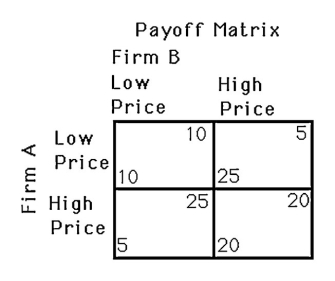
The above figure shows a payoff matrix for two firms, A and B, that must choose between a high-price strategy and a low-price strategy. Both firms setting a high price is NOT a Nash equilibrium because
A)setting a high price is the dominant strategy for each firm.
B)neither firm can improve its payoff by setting a low price given that the other firm is setting a high price.
C)there is no dominant strategy for either firm.
D)both firms can improve their payoff by setting a low price given that the other firm is setting a high price.

Unlock Deck
Unlock for access to all 90 flashcards in this deck.
Unlock Deck
k this deck
22
Which of the following statements is TRUE?
A)If a game has one or more Nash equilibria, then it's not really a game since the solution is known.
B)A game can either have a Nash equilibrium or a dominant strategy solution.
C)If a game has a Nash equilibrium, the game must have a dominant strategy solution.
D)If a game has a dominant strategy solution, the solution must also be a Nash equilibrium.
A)If a game has one or more Nash equilibria, then it's not really a game since the solution is known.
B)A game can either have a Nash equilibrium or a dominant strategy solution.
C)If a game has a Nash equilibrium, the game must have a dominant strategy solution.
D)If a game has a dominant strategy solution, the solution must also be a Nash equilibrium.

Unlock Deck
Unlock for access to all 90 flashcards in this deck.
Unlock Deck
k this deck
23
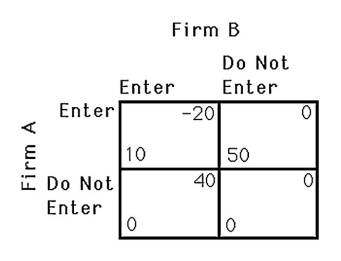
The above figure shows the payoff to two airlines, A and B, of serving a particular route. If the two airlines must decide simultaneously, which one of the following statements is TRUE?
A)Since firm B has no dominant strategy, its decision is unpredictable.
B)Since firm B's decision is unpredictable, firm A's decision is unpredictable.
C)Neither firm entering is a Nash equilibrium.
D)Firm B will not enter because it knows firm A will.

Unlock Deck
Unlock for access to all 90 flashcards in this deck.
Unlock Deck
k this deck
24
In a two-player simultaneous game, if player A has a dominant strategy and player B does not, player B will
A)employ a mixed strategy.
B)choose his best strategy assuming that player A plays her dominant strategy.
C)not achieve a Nash equilibrium.
D)assume that player A does not choose her dominant strategy.
A)employ a mixed strategy.
B)choose his best strategy assuming that player A plays her dominant strategy.
C)not achieve a Nash equilibrium.
D)assume that player A does not choose her dominant strategy.

Unlock Deck
Unlock for access to all 90 flashcards in this deck.
Unlock Deck
k this deck
25
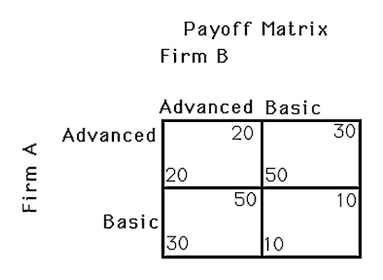
The above figure shows a payoff matrix for two firms, A and B, that must choose between selling basic computers or advanced computers. Which of the following is a Nash equilibrium?
A)Both firms make advanced computers.
B)Both firms make basic computers.
C)Firm A makes basic computers and firm B makes advanced computers.
D)There are no Nash equilibria.

Unlock Deck
Unlock for access to all 90 flashcards in this deck.
Unlock Deck
k this deck
26

The above figure shows a payoff matrix for two firms, A and B, that must choose between selling basic computers or advanced computers. How many Nash equilibria are there?
A)0
B)1
C)2
D)4

Unlock Deck
Unlock for access to all 90 flashcards in this deck.
Unlock Deck
k this deck
27
A single-period duopoly firm can choose output level A or B. The firm decides it will produce level A regardless of what the other firm produces. This decision may occur because
A)producing the output level A is a dominant strategy.
B)this firm has simply decided to always produce at level A.
C)Both A and B are possible.
D)None of the above.
A)producing the output level A is a dominant strategy.
B)this firm has simply decided to always produce at level A.
C)Both A and B are possible.
D)None of the above.

Unlock Deck
Unlock for access to all 90 flashcards in this deck.
Unlock Deck
k this deck
28

The above figure shows a payoff matrix for two firms, A and B, that must choose between a high-price strategy and a low-price strategy. For firm B
A)setting a high price is the dominant strategy.
B)setting a low price is the dominant strategy.
C)there is no dominant strategy.
D)doing the opposite of firm A is always the best strategy.

Unlock Deck
Unlock for access to all 90 flashcards in this deck.
Unlock Deck
k this deck
29
Strategic advertising in the cola market
A)significantly expands the size of the market.
B)brings in few new customers and primarily shifts market share among rivals.
C)shifts market demand to the right, increasing quantity sold and decreasing prices.
D)has no impact on the market.
A)significantly expands the size of the market.
B)brings in few new customers and primarily shifts market share among rivals.
C)shifts market demand to the right, increasing quantity sold and decreasing prices.
D)has no impact on the market.

Unlock Deck
Unlock for access to all 90 flashcards in this deck.
Unlock Deck
k this deck
30

The above figure shows the payoff to two airlines, A and B, of serving a particular route. If the two airlines must decide simultaneously, which one of the following statements is TRUE?
A)Firm A has a dominant strategy.
B)Firm B has a dominant strategy.
C)Neither firm entering is a Nash equilibrium.
D)The outcome of the game is unpredictable.

Unlock Deck
Unlock for access to all 90 flashcards in this deck.
Unlock Deck
k this deck
31
If the payoff to the United States to pursuing nuclear weapons is 100 if the USSR does not pursue nuclear weapons and 50 if the USSR does, and the payoff to the USSR to pursuing nuclear weapons is 80 if the USA doesn't pursue nuclear weapons and 30 if the USA does, what is the non-cooperative equilibrium?
A)The USA pursues nuclear weapons, the USSR does not.
B)The USA pursues nuclear weapons, the USSR pursues nuclear weapons.
C)The USA does not pursue nuclear weapons, the USSR does not pursue nuclear weapons.
D)The USA does not pursue nuclear weapons, the USSR does pursue nuclear weapons.
A)The USA pursues nuclear weapons, the USSR does not.
B)The USA pursues nuclear weapons, the USSR pursues nuclear weapons.
C)The USA does not pursue nuclear weapons, the USSR does not pursue nuclear weapons.
D)The USA does not pursue nuclear weapons, the USSR does pursue nuclear weapons.

Unlock Deck
Unlock for access to all 90 flashcards in this deck.
Unlock Deck
k this deck
32

The above figure shows a payoff matrix for two firms, A and B, that must choose between a high-price strategy and a low-price strategy. The Nash equilibrium in this game
A)does not exist.
B)occurs when both firms set a low price.
C)occurs when both firms set a high price.
D)occurs when firm A sets a high price and firm B sets a low price.

Unlock Deck
Unlock for access to all 90 flashcards in this deck.
Unlock Deck
k this deck
33
Which of the following statements is TRUE about a non-cooperative game?
A)When two players each have a dominant strategy, joint profits may not be maximized.
B)When two players each have a dominant strategy, joint profits are maximized.
C)When players use their best responses, joint profits are maximized.
D)None of the above.
A)When two players each have a dominant strategy, joint profits may not be maximized.
B)When two players each have a dominant strategy, joint profits are maximized.
C)When players use their best responses, joint profits are maximized.
D)None of the above.

Unlock Deck
Unlock for access to all 90 flashcards in this deck.
Unlock Deck
k this deck
34

The above figure shows the payoff to two airlines, A and B, of serving a particular route. If the two airlines must decide simultaneously, what happens if the government imposes a $20 per firm tax on firms that service this route?
A)Neither firm has a dominant strategy.
B)Not entering is a dominant strategy for both firms.
C)Neither firm entering is a Nash equilibrium.
D)Only firm A will enter.

Unlock Deck
Unlock for access to all 90 flashcards in this deck.
Unlock Deck
k this deck
35

The above figure shows a payoff matrix for two firms, A and B, that must choose between selling basic computers or advanced computers. Firm B's dominant strategy
A)is to make basic computers.
B)is to make advanced computers.
C)is to adopt firm A's strategy.
D)does not exist in this game.

Unlock Deck
Unlock for access to all 90 flashcards in this deck.
Unlock Deck
k this deck
36

The above figure shows the payoff to two airlines, A and B, of serving a particular route. If the two airlines must decide simultaneously, and the government imposes a $20 per firm tax on firms that service this route, which of the following maximizes the firms' joint profits?
A)Neither firm services the route.
B)Firm A offers firm B $20 to not enter.
C)Both firms will service this route.
D)Firm B offers firm A $30 to not enter.

Unlock Deck
Unlock for access to all 90 flashcards in this deck.
Unlock Deck
k this deck
37

The above figure shows the payoff to two airlines, A and B, of serving a particular route. If the two airlines must decide simultaneously, which one of the following statements is TRUE?
A)Firm A does not have a dominant strategy.
B)Firm B does not have a dominant strategy.
C)Neither firm entering is a Nash equilibrium.
D)The outcome of the game is unpredictable.

Unlock Deck
Unlock for access to all 90 flashcards in this deck.
Unlock Deck
k this deck
38
If each player in a game uses a strategy that results in a Nash equilibrium outcome, the players are most likely to say
A)"I don't like my choice, because I think I could have done better."
B)"Given the strategies chosen by the other players in the game, I probably could have done better if I had more time."
C)"Given the strategies chosen by the other players in the game, I made the best possible choice."
D)"There was no real strategy on my part, I basically made an educated guess."
A)"I don't like my choice, because I think I could have done better."
B)"Given the strategies chosen by the other players in the game, I probably could have done better if I had more time."
C)"Given the strategies chosen by the other players in the game, I made the best possible choice."
D)"There was no real strategy on my part, I basically made an educated guess."

Unlock Deck
Unlock for access to all 90 flashcards in this deck.
Unlock Deck
k this deck
39

The above figure shows the payoff to two airlines, A and B, of serving a particular route. If the two airlines must decide simultaneously, which one of the following statements is TRUE?
A)Only firm A will enter the market.
B)Only firm B will enter the market.
C)Neither firm entering is a Nash equilibrium.
D)The outcome of the game is unpredictable.

Unlock Deck
Unlock for access to all 90 flashcards in this deck.
Unlock Deck
k this deck
40

The above figure shows the payoff to two airlines, A and B, of serving a particular route. If the two airlines must decide simultaneously, what will happen if the government offers a $30 subsidy to airlines that serve this route?
A)Both firms will enter profitably.
B)Firm A will decide not to enter since firm B will.
C)Firm B is still better off not entering.
D)Neither firm will have a dominant strategy.

Unlock Deck
Unlock for access to all 90 flashcards in this deck.
Unlock Deck
k this deck
41
If a game has a pure strategy Nash equilibrium then
A)it might also have a mixed strategy equilibrium.
B)it does not have a mixed strategy equilibrium.
C)at least one player has a dominant strategy.
D)no player has a dominant strategy.
A)it might also have a mixed strategy equilibrium.
B)it does not have a mixed strategy equilibrium.
C)at least one player has a dominant strategy.
D)no player has a dominant strategy.

Unlock Deck
Unlock for access to all 90 flashcards in this deck.
Unlock Deck
k this deck
42
What is the primary difference between a mixed strategy and a pure strategy?
A)Pure strategies are always dominated strategies.
B)Mixed strategies call for randomizing over possible actions, pure strategies do not.
C)Pure strategies are much more common than mixed strategies.
D)Mixed strategies are not optimal whereas pure strategies are.
A)Pure strategies are always dominated strategies.
B)Mixed strategies call for randomizing over possible actions, pure strategies do not.
C)Pure strategies are much more common than mixed strategies.
D)Mixed strategies are not optimal whereas pure strategies are.

Unlock Deck
Unlock for access to all 90 flashcards in this deck.
Unlock Deck
k this deck
43
After analyzing his opponent, a tennis player decides to serve 10% of his serves to the left, 50% of his serves to the right, and 40% of his serves at the body of his opponent. This illustrates a
A)deterministic strategy.
B)a dominant strategy.
C)mixed strategy.
D)non-game theoretic problem.
A)deterministic strategy.
B)a dominant strategy.
C)mixed strategy.
D)non-game theoretic problem.

Unlock Deck
Unlock for access to all 90 flashcards in this deck.
Unlock Deck
k this deck
44
Cheap talk
A)is never credible.
B)is illegal.
C)generally affects the game's payoffs.
D)can be credible when both firms have an incentive to be truthful.
A)is never credible.
B)is illegal.
C)generally affects the game's payoffs.
D)can be credible when both firms have an incentive to be truthful.

Unlock Deck
Unlock for access to all 90 flashcards in this deck.
Unlock Deck
k this deck
45
A mixed strategy may
A)be part of a Nash equilibrium.
B)be a set of probabilities of selecting each possible action.
C)lead identical firms to choose different actions.
D)All of the above.
A)be part of a Nash equilibrium.
B)be a set of probabilities of selecting each possible action.
C)lead identical firms to choose different actions.
D)All of the above.

Unlock Deck
Unlock for access to all 90 flashcards in this deck.
Unlock Deck
k this deck
46
A coordination game
A)is a game with multiple Nash equilibria where players can credibly coordinate to select one of the equilibria.
B)is a game where players coordinate to maximize joint profits.
C)cannot be solved with cheap talk.
D)always has one Nash equilibrium and no dominated strategies.
A)is a game with multiple Nash equilibria where players can credibly coordinate to select one of the equilibria.
B)is a game where players coordinate to maximize joint profits.
C)cannot be solved with cheap talk.
D)always has one Nash equilibrium and no dominated strategies.

Unlock Deck
Unlock for access to all 90 flashcards in this deck.
Unlock Deck
k this deck
47
A strategy in which a player uses probabilities to decide which strategy to use is called a
A)pure strategy.
B)mixed strategy.
C)Pareto strategy.
D)coin flip strategy.
A)pure strategy.
B)mixed strategy.
C)Pareto strategy.
D)coin flip strategy.

Unlock Deck
Unlock for access to all 90 flashcards in this deck.
Unlock Deck
k this deck
48
If neither firm has a dominant strategy, a Nash equilibrium cannot exist.

Unlock Deck
Unlock for access to all 90 flashcards in this deck.
Unlock Deck
k this deck
49
In the following game, how many Nash equilibria are there? 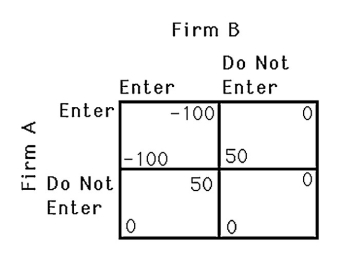
A)0
B)1
C)2
D)unable to determine

A)0
B)1
C)2
D)unable to determine

Unlock Deck
Unlock for access to all 90 flashcards in this deck.
Unlock Deck
k this deck
50
The figure shows the payoffs to two airlines, A and B, of serving a particular route. Is there a Nash equilibrium? What is it? Explain. 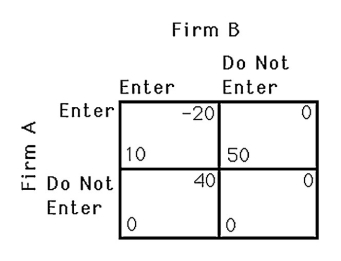


Unlock Deck
Unlock for access to all 90 flashcards in this deck.
Unlock Deck
k this deck
51
One reason that it might be difficult for a player to determine his best strategy is that
A)he might have limited ability to calculate the possible outcomes.
B)he is irrational.
C)there is no pure strategy.
D)there are multiple Nash equilibria.
A)he might have limited ability to calculate the possible outcomes.
B)he is irrational.
C)there is no pure strategy.
D)there are multiple Nash equilibria.

Unlock Deck
Unlock for access to all 90 flashcards in this deck.
Unlock Deck
k this deck
52
In game theory, we usually assume that all players
A)act rationally.
B)use the information available to them to decide on a best strategy.
C)know about the payoffs of the other players.
D)All of the above.
A)act rationally.
B)use the information available to them to decide on a best strategy.
C)know about the payoffs of the other players.
D)All of the above.

Unlock Deck
Unlock for access to all 90 flashcards in this deck.
Unlock Deck
k this deck
53
Which of the following can always be used to determine the outcome when there are multiple Nash equilibria?
A)the Pareto Criterion
B)cheap talk
C)Both A and B
D)None of the above.
A)the Pareto Criterion
B)cheap talk
C)Both A and B
D)None of the above.

Unlock Deck
Unlock for access to all 90 flashcards in this deck.
Unlock Deck
k this deck
54
Communication between players prior to the start of a game that does NOT affect the payoffs is called
A)cheap talk.
B)ineffective bargaining.
C)a binding verbal contract.
D)pareto efficient.
A)cheap talk.
B)ineffective bargaining.
C)a binding verbal contract.
D)pareto efficient.

Unlock Deck
Unlock for access to all 90 flashcards in this deck.
Unlock Deck
k this deck
55
Not all games with two or more Nash equilibria can be solved with pre-play communication because
A)cheap talk may be illegal under anti-trust laws.
B)if there's an incentive for one or more players to lie, then cheap talk lacks credibility.
C)pareto criterion might not be defined.
D)Both A and B
A)cheap talk may be illegal under anti-trust laws.
B)if there's an incentive for one or more players to lie, then cheap talk lacks credibility.
C)pareto criterion might not be defined.
D)Both A and B

Unlock Deck
Unlock for access to all 90 flashcards in this deck.
Unlock Deck
k this deck
56
"Cheap talk" is considered cheap because
A)communications via phone or email these days has a cost that is close to zero.
B)a firm can say anything, but may actually do something different.
C)the cost of talking is far outweighed by the gains to be made in coordinating efforts.
D)firms avoid the costs of hiring lawyers.
A)communications via phone or email these days has a cost that is close to zero.
B)a firm can say anything, but may actually do something different.
C)the cost of talking is far outweighed by the gains to be made in coordinating efforts.
D)firms avoid the costs of hiring lawyers.

Unlock Deck
Unlock for access to all 90 flashcards in this deck.
Unlock Deck
k this deck
57
When firms select the solution that is better for all parties, the ________ is satisfied.
A)Nash equilibrium condition
B)Pareto Criterion
C)coordination game requirement
D)pure strategy requirement
A)Nash equilibrium condition
B)Pareto Criterion
C)coordination game requirement
D)pure strategy requirement

Unlock Deck
Unlock for access to all 90 flashcards in this deck.
Unlock Deck
k this deck
58
When neither player has a dominant strategy
A)game theory will not provide information.
B)no Nash equilibrium exists.
C)at least one Nash equilibrium exists.
D)the game cannot be analyzed.
A)game theory will not provide information.
B)no Nash equilibrium exists.
C)at least one Nash equilibrium exists.
D)the game cannot be analyzed.

Unlock Deck
Unlock for access to all 90 flashcards in this deck.
Unlock Deck
k this deck
59
The figure shows the payoff for two firms, A and B, that must each choose to sell either at a high or low price. Determine the dominant strategies for each firm (if any)and the Nash equilibria (if any). 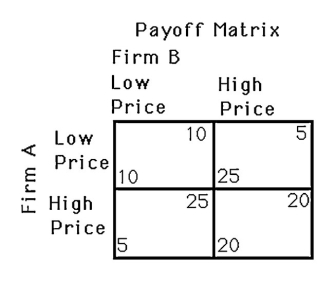


Unlock Deck
Unlock for access to all 90 flashcards in this deck.
Unlock Deck
k this deck
60
Suppose two firms, A and B, are simultaneously considering entry into a new market. If neither enters, both earn zero. If both enter, they both lose 100. If one firm enters, it gains 50 while the other earns zero. Set up the payoff matrix for this game and determine if any Nash equilibria exist. Can you predict the outcome? What if firm A gets to decide first?

Unlock Deck
Unlock for access to all 90 flashcards in this deck.
Unlock Deck
k this deck
61
If a game contains private information, then
A)the game's outcome is affected.
B)firms will engage in cheap talk to coordinate their actions.
C)players will decide not to play the game.
D)third-party negotiations are necessary to resolve the information gap.
A)the game's outcome is affected.
B)firms will engage in cheap talk to coordinate their actions.
C)players will decide not to play the game.
D)third-party negotiations are necessary to resolve the information gap.

Unlock Deck
Unlock for access to all 90 flashcards in this deck.
Unlock Deck
k this deck
62
In a bargaining game, players
A)are forced to negotiate, as in a mediation.
B)voluntarily negotiate.
C)are engaging in illegal activity.
D)Both B and C
A)are forced to negotiate, as in a mediation.
B)voluntarily negotiate.
C)are engaging in illegal activity.
D)Both B and C

Unlock Deck
Unlock for access to all 90 flashcards in this deck.
Unlock Deck
k this deck
63
One possible source of inefficiency in bargaining is
A)that there are multiple Nash equilibria.
B)bounded irrationality.
C)that the Nash product may be indeterminant.
D)that the bargaining process takes time.
A)that there are multiple Nash equilibria.
B)bounded irrationality.
C)that the Nash product may be indeterminant.
D)that the bargaining process takes time.

Unlock Deck
Unlock for access to all 90 flashcards in this deck.
Unlock Deck
k this deck
64
If you take a maximin strategy
A)you are irrational according to economic definition.
B)you are ensuring that the other player gets the worst possible outcome.
C)you are getting the best possible outcome given that the other player does the thing that's worst for you.
D)then both players are doing the best they can given the payoffs in the game.
A)you are irrational according to economic definition.
B)you are ensuring that the other player gets the worst possible outcome.
C)you are getting the best possible outcome given that the other player does the thing that's worst for you.
D)then both players are doing the best they can given the payoffs in the game.

Unlock Deck
Unlock for access to all 90 flashcards in this deck.
Unlock Deck
k this deck
65
A maximin strategy
A)maximizes the minimum payoff.
B)minimizes the maximum payoff.
C)maximizes the payoff of one player, but minimizes the payoff of the other.
D)maximizes the minimum joint profits of the players.
A)maximizes the minimum payoff.
B)minimizes the maximum payoff.
C)maximizes the payoff of one player, but minimizes the payoff of the other.
D)maximizes the minimum joint profits of the players.

Unlock Deck
Unlock for access to all 90 flashcards in this deck.
Unlock Deck
k this deck
66
If the managers of your firm have bounded rationality, then
A)the firm should fire them and hire more competent managers.
B)a Nash equilibrium does not exist.
C)they are limited in their ability to calculate and may not succeed in maximizing profits.
D)it is not possible to maximize profits.
A)the firm should fire them and hire more competent managers.
B)a Nash equilibrium does not exist.
C)they are limited in their ability to calculate and may not succeed in maximizing profits.
D)it is not possible to maximize profits.

Unlock Deck
Unlock for access to all 90 flashcards in this deck.
Unlock Deck
k this deck
67
In the example of coordination problems between Google and Motorola Mobility, one method to solve the problems was
A)to undertake a merger or acquisition.
B)form a joint venture.
C)for one firm to subcontract with the other.
D)All of the above.
A)to undertake a merger or acquisition.
B)form a joint venture.
C)for one firm to subcontract with the other.
D)All of the above.

Unlock Deck
Unlock for access to all 90 flashcards in this deck.
Unlock Deck
k this deck
68
A disagreement point is
A)an item of contention between the two bargaining players.
B)a way of keeping score in a negotiation.
C)the point in a negotiation where the players cannot reach an agreement.
D)the outcome that occurs if there is no agreement in a bargain.
A)an item of contention between the two bargaining players.
B)a way of keeping score in a negotiation.
C)the point in a negotiation where the players cannot reach an agreement.
D)the outcome that occurs if there is no agreement in a bargain.

Unlock Deck
Unlock for access to all 90 flashcards in this deck.
Unlock Deck
k this deck
69
When a bargaining solution is reached
A)each player receives a net surplus greater than or equal to zero.
B)we have a Nash equilibrium.
C)the sum of the net surpluses is the Nash product.
D)Both A and C.
A)each player receives a net surplus greater than or equal to zero.
B)we have a Nash equilibrium.
C)the sum of the net surpluses is the Nash product.
D)Both A and C.

Unlock Deck
Unlock for access to all 90 flashcards in this deck.
Unlock Deck
k this deck
70
A sale in which property or a service is sold to the highest bidder is called a(n)
A)auction.
B)bidder sale.
C)competitive market.
D)austrian bundle.
A)auction.
B)bidder sale.
C)competitive market.
D)austrian bundle.

Unlock Deck
Unlock for access to all 90 flashcards in this deck.
Unlock Deck
k this deck
71
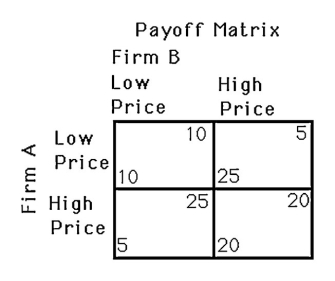
In the above figure, the Nash product is
A)20.
B)40.
C)100.
D)400.

Unlock Deck
Unlock for access to all 90 flashcards in this deck.
Unlock Deck
k this deck
72
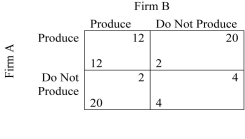
In the above table, if the players use a maximin strategy
A)the equilibrium is for both firms to produce.
B)the equilibrium choice is the same as using a regular, best response strategy.
C)the equilibrium is for A to produce and B not to produce.
D)the equilibrium is for B to produce and A not to produce.

Unlock Deck
Unlock for access to all 90 flashcards in this deck.
Unlock Deck
k this deck
73
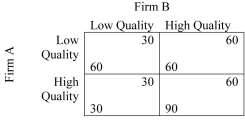
In the above table, if the players use a maximin strategy
A)firm A produces a High Quality product and firm B produces a Low Quality product.
B)the equilibrium choice is the same as using a regular, best response strategy.
C)both firms produce a High Quality product.
D)firm A produces a Low Quality product and firm B produces a High Quality product.

Unlock Deck
Unlock for access to all 90 flashcards in this deck.
Unlock Deck
k this deck
74
In an English auction
A)the price decreases until someone bids.
B)the price increases until nobody else will raise the bid.
C)bidders put their bids in a sealed envelope.
D)the winning bidder pays the amount bid by the person with the second highest bid.
A)the price decreases until someone bids.
B)the price increases until nobody else will raise the bid.
C)bidders put their bids in a sealed envelope.
D)the winning bidder pays the amount bid by the person with the second highest bid.

Unlock Deck
Unlock for access to all 90 flashcards in this deck.
Unlock Deck
k this deck
75
A Nash bargaining solution
A)is not the same as a Nash equilibrium.
B)is derived from a Nash equilibrium.
C)gives a solution in both cooperative and non-cooperative games.
D)None of the above.
A)is not the same as a Nash equilibrium.
B)is derived from a Nash equilibrium.
C)gives a solution in both cooperative and non-cooperative games.
D)None of the above.

Unlock Deck
Unlock for access to all 90 flashcards in this deck.
Unlock Deck
k this deck
76
Bargaining does NOT normally occur in
A)vertical business relationships.
B)wages and working conditions under a union contract.
C)posted price markets.
D)the legal system.
A)vertical business relationships.
B)wages and working conditions under a union contract.
C)posted price markets.
D)the legal system.

Unlock Deck
Unlock for access to all 90 flashcards in this deck.
Unlock Deck
k this deck
77
In a bargaining solution, a player's net surplus is
A)the amount of total surplus minus any deadweight loss.
B)the difference between what the player receives in the final bargain minus what she would have gotten from the disagreement point.
C)the amount of consumer surplus she receives minus any deadweight loss.
D)always maximized.
A)the amount of total surplus minus any deadweight loss.
B)the difference between what the player receives in the final bargain minus what she would have gotten from the disagreement point.
C)the amount of consumer surplus she receives minus any deadweight loss.
D)always maximized.

Unlock Deck
Unlock for access to all 90 flashcards in this deck.
Unlock Deck
k this deck
78
If decision makers have limited ability to calculate profits from all possible combinations of options, they are said to have
A)dementia.
B)bounded rationality.
C)Pareto inefficiency.
D)a maximin problem.
A)dementia.
B)bounded rationality.
C)Pareto inefficiency.
D)a maximin problem.

Unlock Deck
Unlock for access to all 90 flashcards in this deck.
Unlock Deck
k this deck
79
An auction in which the price announced by the auctioneer DESCENDS is called a(n)
A)Dutch Auction.
B)English Auction.
C)Sealed Bid Auction.
D)Descending Option Auction.
A)Dutch Auction.
B)English Auction.
C)Sealed Bid Auction.
D)Descending Option Auction.

Unlock Deck
Unlock for access to all 90 flashcards in this deck.
Unlock Deck
k this deck
80
If a firm does NOT know its rival's profit function, then we consider that information to be
A)irrelevant in deciding its best strategy.
B)private.
C)common knowledge.
D)Pareto sub-optimal.
A)irrelevant in deciding its best strategy.
B)private.
C)common knowledge.
D)Pareto sub-optimal.

Unlock Deck
Unlock for access to all 90 flashcards in this deck.
Unlock Deck
k this deck


